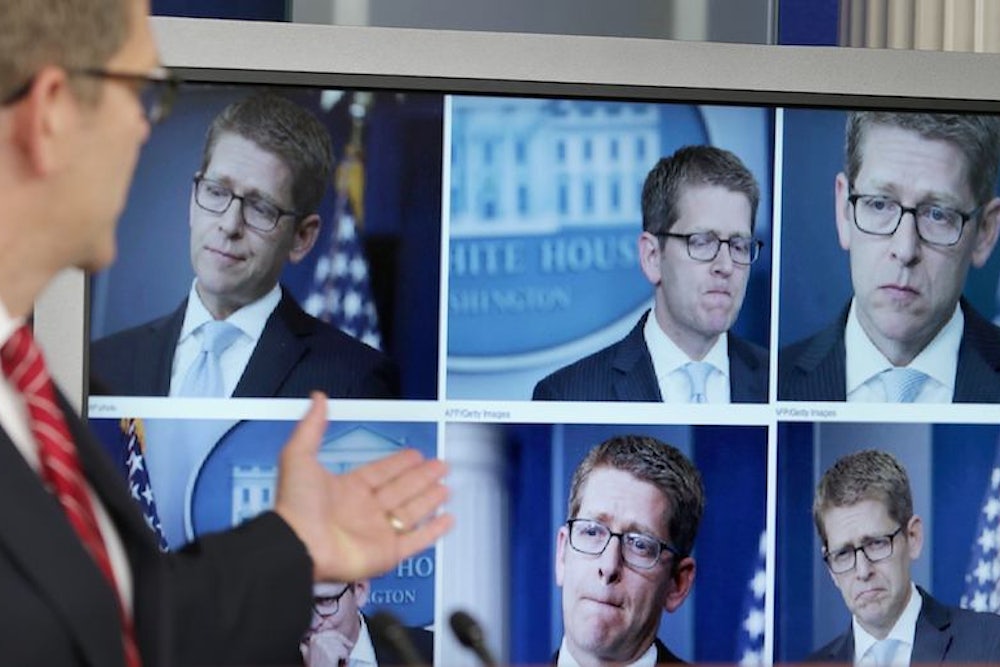According to pretty much everybody, last week was a rough one for White House spokesman Jay Carney. Dana Milbank ripped him in The Washington Post, Eleanor Clift felt his pain so acutely she helped him relive it in The Daily Beast. Alex Koppelman accused him of playing “semantic games” in The New Yorker. And then there were the conservative commentators. So all in all, I’d have to say he had a pretty good week—and I mean that sincerely.
My moment of epiphany on presidential scandals came during the first term of the Clinton administration, when Mike McCurry was press secretary. I was editorial page editor of The Washington Times at the time, a job I held from 1992 through 1998. The bookends of my tenure were the nomination of Clarence Thomas to the U.S. Supreme Court and the House vote to impeach Bill Clinton; then as now, never a shortage of material. And if it’s true that what goes around comes around, I think it would be fair to say that in that period in Washington, everything that went around did indeed come around.
I was in my office one day when one of my editorial writers came in in a state of medium-grade agitation, a condition that is about the norm among professional polemicists. He had been reading the transcript of McCurry’s daily White House press briefing—in fact, I think he brought a printout of the transcript with him in order to read it aloud to me in indignation. He was outraged by McCurry’s transparent, shameless, and indeed smug evasion of whatever the issue at hand might have been that day. He wanted to write an editorial calling McCurry on the carpet. A pretty standard request, and I was about to say yes.
Then it hit me: That’s exactly what Mike McCurry wants the subject of tomorrow’s editorial in The Washington Times to be. Every hostile editorial in any newspaper, every critical column, every raising-more-questions-than-he-answered “news analysis” about McCurry and what he said at the press briefing would mean one less editorial or column about his boss, Bill Clinton, and the trouble he’s in, and his responsibility for what goes on in his administration, and why his answers aren’t convincing. I had a vision of Clinton reading the clippings of the denunciations of McCurry and laughing. Then the vision expanded, and it was not just Clinton reading the clippings and laughing, but Clinton and McCurry together reading and laughing.
If anyone knew he was acting a part on stage every day, it was the incomparable McCurry. An essential element of the job of press secretary is to serve as flak-catcher—but not in the sense of the hapless anti-poverty bureaucrats of Tom Wolfe’s essay. McCurry knew that he was a sort of media-age praetorian guard, and the more hectoring he absorbed and the more he personally became the story, the better job he was doing in protecting the president. He even seemed to relish it, in a way that (for example) Ari Fleischer never did in service to George W. Bush.
The Clinton press operation was remarkable in many respects, not least for the number and severity of the scandals it had to cope with and the success it had in doing so. One especially brilliant coup de main in the second term was the simple refusal of McCurry, during his daily press briefings, to answer any scandal-related questions at all. Beginning in 1996 with the campaign-finance scandal and continuing through the Monica Lewinsky affair, the White House insisted that all questions on such subjects be directed to Lanny Davis, the president’s new special counsel for, well, scandals. The strangest thing was that the White House press corps went along with it. And lest you think that this was somehow all the cleverness of the press operation and not of the boss, recall that Clinton as governor of Arkansas had the local press corps sufficiently under his thumb that he was able to get away with not releasing his 1978 and 1979 income-tax returns showing Hillary’s $100,000 cattle-futures trading profits until 1994.
I don’t think Obama has a sense of humor equal to Bill Clinton’s. Nor do I think Jay Carney has Mike McCurry’s puckishness, though he took a stab at it during his Friday briefing. Nor does Carney have McCurry’s contemptuous sense of superiority over the press corps. It’s hard to imagine the incumbent president and his press secretary sharing a laugh over how Jay Carney’s tough week has served Obama’s political interests. But when the going gets rough, which it certainly is now, and all eyes are on the president’s press secretary, Obama is actually doing about as well as he could hope.
